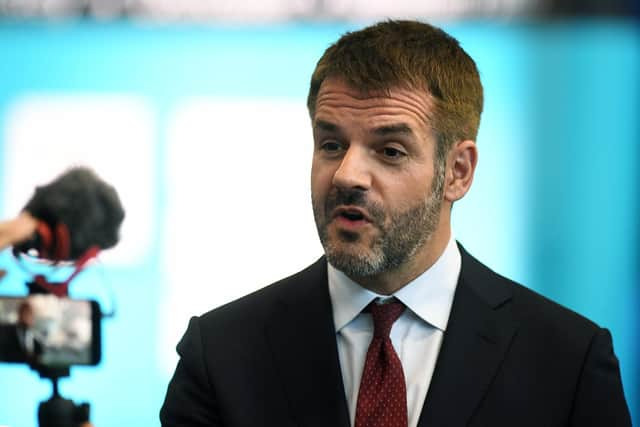South Yorkshire should be next for enhanced devolved powers, says Mayor
Oliver Coppard, the Mayor of South Yorkshire, told The Yorkshire Post that the region should be given a single pot of money like the Greater Manchester and the West Midlands mayors under plans being considered by ministers.
“We do not yet have the powers that South Yorkshire needs to thrive,” he said.
Advertisement
Hide AdAdvertisement
Hide Ad“Our devolution deal was signed 8 years ago – with funding at about half the level of the recent North East deal – and lacks powers around housing, transport, innovation and health seen elsewhere.


“But the good news is that we’re in a prime position to change that. South Yorkshire has strong, ambitious political leaders and a track record of constructive partnership with Government.
“I’m in regular contact with the Mayors of Greater Manchester and the West Midlands as they progress their own devolution “trailblazer” deals; and I’m talking to Ministers on a regular basis about making sure South Yorkshire is at the front of the queue for any negotiations on further devolution of powers and resources.
“That deal will help us stand on our own two feet. We need control of our finances and a single pot of money; and increased influence over the decisions made every day in Whitehall that could be made here in South Yorkshire.
Advertisement
Hide AdAdvertisement
Hide Ad“We want a true partnership with the Government, and the freedom to get on and deliver for our communities.”
Sheffield was last year chosen as one of 20 “regeneration zones” proposed by Michael Gove.
A report from Centre for Cities, published last year, said that for every £1 of public money in these schemes could unlock five times as much in private investment.
These zones were later scrapped under Liz Truss, before being rolled into the “investment zones” programme which she had previously suggested, which has now been continued by Mr Gove.
Advertisement
Hide AdAdvertisement
Hide AdHenri Murison, Chief Executive of the Northern Powerhouse Partnership, said: “It is right that Michael Gove has highlighted Sheffield’s credentials for an investment zone.
“There is potential for much more beyond the existing partnership between both universities and the councils in Sheffield and Rotherham in particular, which yielded the Advanced Manufacturing Park anchored by the AMRC as well as the Olympic Legacy Park.
“The Northern Gritstone fund is backing a pipeline of game-changing start ups. This is part of a vibrant ecosystem and there is much more that can be done from Sheffield city centre which can match the success of the Oxford Road Corridor in Manchester or the Helix in Newcastle.”
It comes after the Chancellor said that levelling up formed part of one of his so-called four “E” pillars against which he would assess growth policies: enterprise, education, employment and everywhere, during a speech last year.
Advertisement
Hide AdAdvertisement
Hide AdUnveiling proposals to drive regional economic prosperity, the Cabinet minister said the Treasury would be identifying investment zone sites that could be turned into “mini-Canary Wharfs”.
The regeneration of the docklands area since the 1980s has led to the creation of a major financial centre in east London.
Promising to provide “high-potential but underperforming areas” with “advantageous fiscal treatment to attract new investment”, he said work on identifying the locations would start shortly.
Last month, Michael Gove, the Levelling Up Secretary, said that universities would be key to the investment zone programme.
Advertisement
Hide AdAdvertisement
Hide Ad“This country has no shortage of growth industries, whether in advanced manufacturing, renewable industries or life sciences. And we have no shortage of world-class universities,” he said.
“But where we have underperformed is leveraging the success of these industries and research to support growth across the whole country and particularly in communities in need of regeneration.”